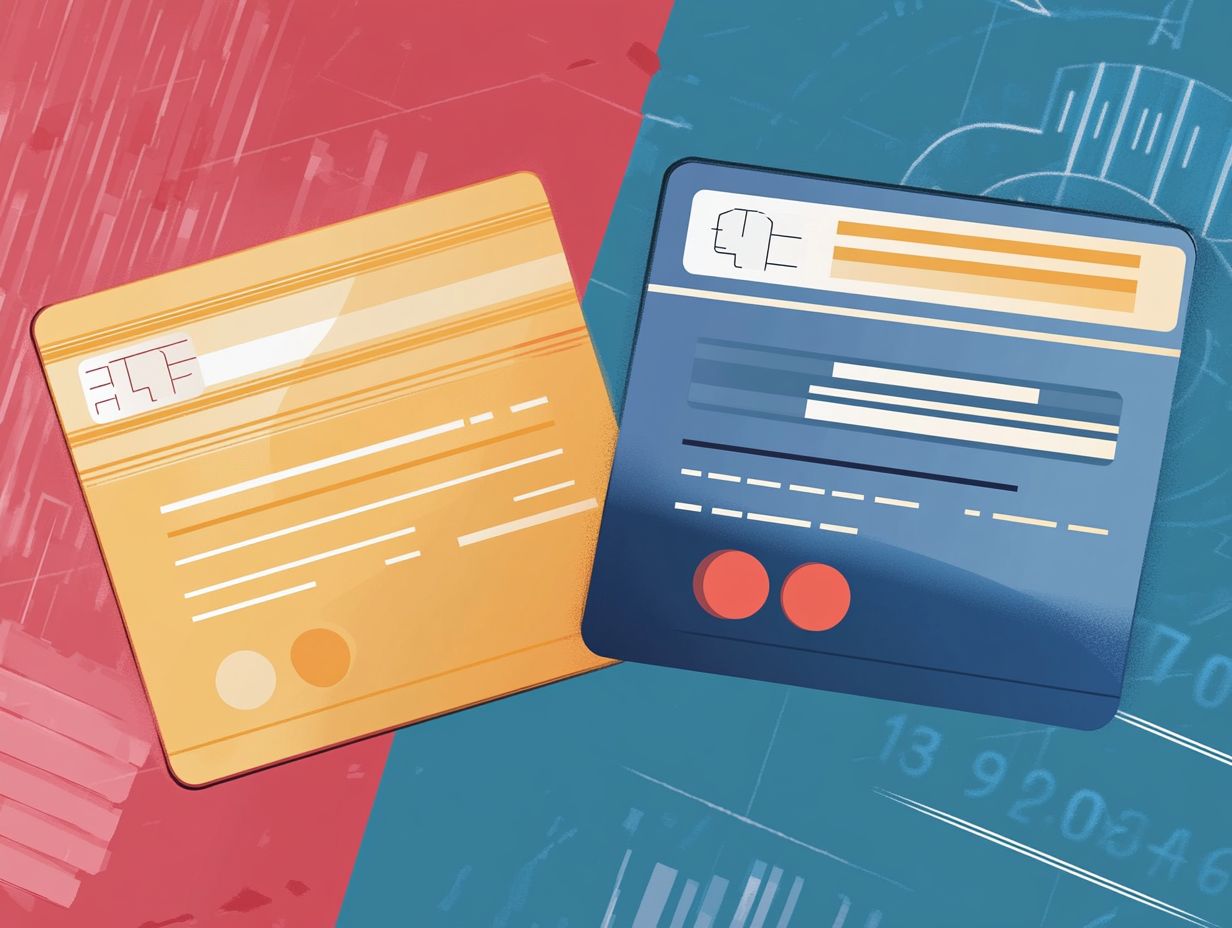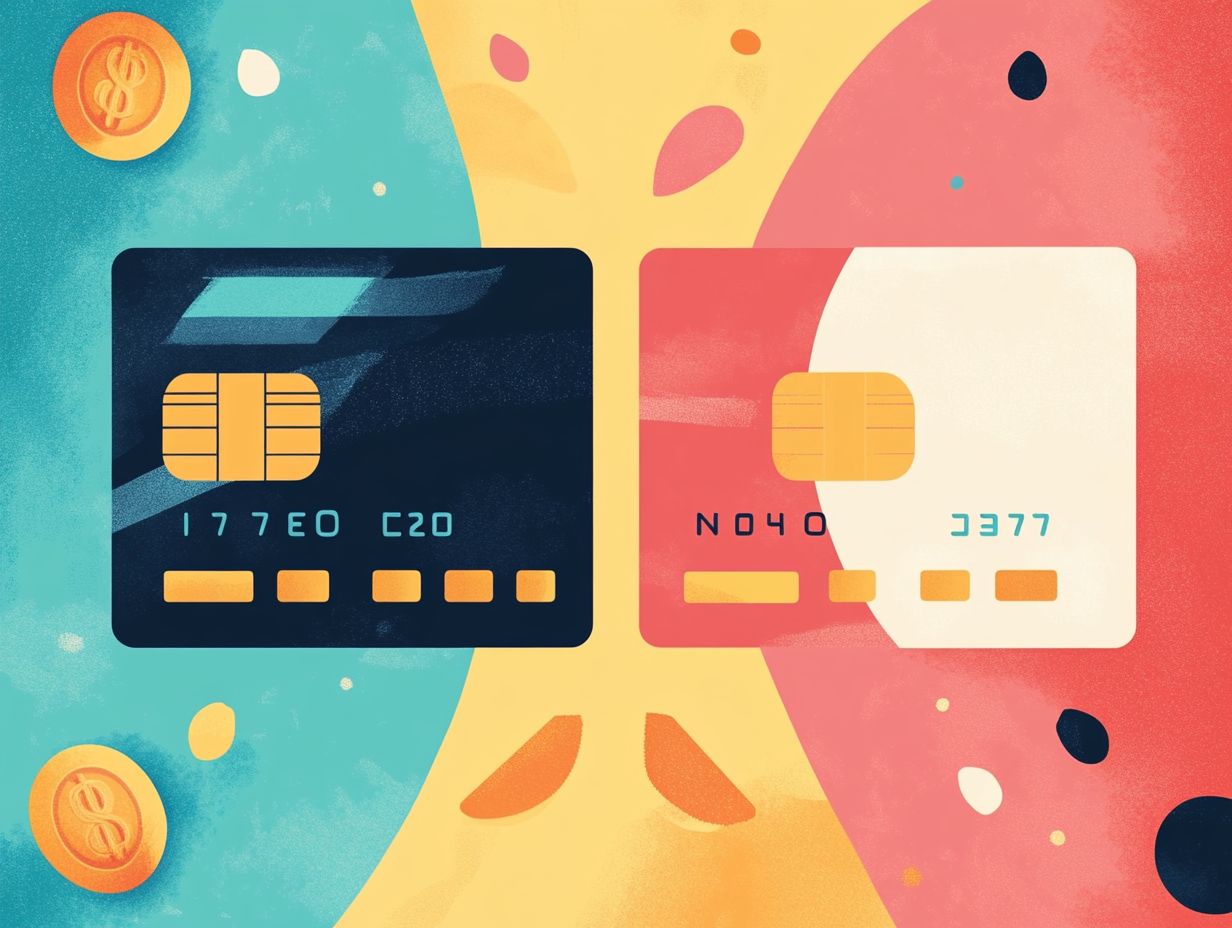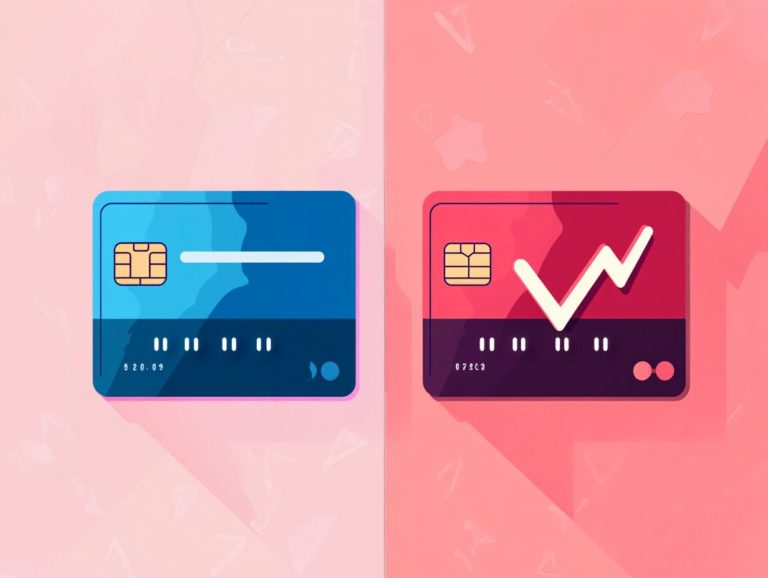Understanding Credit Card Terms: A Comparison
Navigating the world of credit cards can indeed feel overwhelming, especially when confronted with the jargon that often clouds the landscape.
This article will demystify essential credit card terms such as interest rates, grace periods, and annual fees, clarifying their meanings for you. You’ll discover key differences between various cards and gain insights on selecting the ideal one tailored to your needs.
By the end of this journey, you ll be well-equipped to make informed financial decisions with confidence and clarity.
Contents
Key Takeaways:

- Understanding credit card terms is crucial for managing your finances and avoiding unnecessary fees and charges.
- Interest rates, grace periods, annual fees, and credit limits are common credit card terms that can greatly impact your overall experience.
- When comparing credit cards, look at key differences such as interest rates and fees. Consider factors like your spending habits and financial goals to choose the right card.
What are Credit Card Terms?
Credit card terms include the specific conditions and rates linked to credit card usage, playing a pivotal role in your financial health and spending patterns. Key elements include the annual percentage rate (APR), which dictates the interest on any outstanding balances, and the grace period, a time frame during which no interest accrues if you pay off your balance in full.
Grasping these terms is essential for effective credit management. They can significantly affect your credit score, credit utilization, and overall financial strategy.
Common Credit Card Terms and Definitions
Understanding common credit card terms is essential for navigating the credit landscape with confidence. Key elements include:
- The billing cycle, which denotes the period between statement dates.
- The annual fee, a charge some cards impose for membership.
- Cash back rewards, allowing you to earn a percentage of your spending back.
Being well-versed in these terms is vital for optimizing your credit card usage, steering clear of unnecessary fees, and maintaining a healthy credit score.
Interest Rates
Interest rates, particularly the annual percentage rate (APR), play a vital role in credit card agreements. They directly influence how much you pay in interest on borrowed balances. These rates can fluctuate significantly based on factors like your credit score and credit utilization. Higher rates typically apply to cash advances and balance transfers, which can accumulate rapidly if not handled with care.
Understanding how these rates are calculated illuminates their effects on your outstanding balances. For example, while standard purchases may have a lower APR, cash advances usually carry much higher rates and start accruing interest right away.
Although balance transfers might come with enticing promotional rates, be cautious; they often revert to elevated APRs if not settled within a certain timeframe. This distinction impacts your overall credit costs, necessitating that you strategize your payments thoughtfully.
By prioritizing high-interest debts and ensuring timely payments, you can effectively minimize interest costs, ultimately saving money and enhancing your financial well-being.
Ready to take the next step in understanding credit? Explore your options and make informed choices today!
Grace Period

The grace period is an important time in your credit card experience. It allows you to sidestep interest on your purchases, provided you pay off the balance in full before the deadline.
This period typically follows the billing cycle and is essential for maintaining a good payment history. A good payment history directly influences your credit score and overall credit health.
Grasping how grace periods work can significantly elevate your financial management strategies. Different credit cards offer varied grace periods, ranging from a few weeks to even two full billing cycles. Familiarize yourself with the specific terms of your card to make the most of this time.
Neglecting this opportunity can lead to the dreaded accumulation of interest charges. These charges can snowball into increased debt and adversely affect your payment history. Consistent late payments can diminish your credit score, complicating your ability to borrow in the future.
Don t miss this chance to save on interest! Therefore, leveraging grace periods strategically isn’t just a suggestion; it’s a fundamental practice for cultivating positive credit management habits.
Annual Fees
Annual fees are charges that some credit cards impose for the privilege of accessing certain benefits, like cash back rewards or promotional rates. While some cards come without an annual fee, others may charge you significantly. Weigh these costs against the benefits when selecting a credit card.
This consideration becomes especially relevant when evaluating premium credit cards, which often come with hefty fees in exchange for enhanced rewards, travel perks, or exclusive offers. You might find yourself balancing enticing bonus structures with the annual fee’s impact on your overall budget.
If you travel frequently or spend heavily in specific categories, those rewards can potentially outweigh the fees. However, this requires careful calculations on your part. These fees can also influence your decisions regarding credit limits, prompting you to choose cards with lower thresholds if the annual charge feels too steep. This ultimately shapes your broader financial strategy.
Credit Limit
A credit limit sets the maximum amount you can borrow on your credit card. It directly influences your spending potential and credit utilization ratios. This limit is crucial for maintaining a strong credit score.
Exceeding your limit or consistently hitting high utilization can negatively impact your creditworthiness, leading to higher interest rates or penalties. Credit bureaus establish these limits based on several factors, including your income, credit history, and existing debt obligations.
A higher income typically suggests a greater ability to repay borrowed funds, often resulting in increased credit limits. A solid credit history with timely payments can enhance this potential.
Keep your credit use low ideally under 30% to show lenders you’re responsible with debt. High credit limits without proper management can create a false sense of financial security, potentially leading to overspending and adversely affecting your overall financial health.
Comparing Credit Card Terms
When comparing credit card terms, carefully assess a range of factors, including promotional rates, interest rates, and associated fees for a better understanding. Refer to understanding credit card terms to make an informed decision.
Each card presents unique benefits, whether it s cash back or travel miles, catering to different spending habits and financial objectives. This thorough comparison is crucial for optimizing your credit card usage and enhancing your credit score.
Key Differences Between Cards

Key differences between credit cards can greatly shape your financial experience. These differences include interest rates, cash back rewards, and foreign transaction fees.
Some cards might entice you with attractive cash back rates. However, they could also carry higher interest rates.
This variation means it’s essential for you to evaluate your spending habits and financial goals before choosing a card. For example, if you’re someone who frequently travels abroad, you might prioritize a card with minimal foreign transaction fees, even if it has a more modest rewards program.
Conversely, if you’re a dedicated shopper, you might lean towards a card that maximizes cash back on your everyday purchases.
Understanding how interest rates can impact potential debt is crucial in your decision-making process. Higher interest rates can quickly diminish the advantages of a generous rewards program if you carry a balance. This underscores the importance of aligning your credit options with your money plan.
Choosing the Right Credit Card for You
Choosing the right credit card demands your careful attention to several key factors, such as your credit score, spending habits, and financial goals. Each of these elements significantly impacts which card will truly suit your needs.
Evaluate your options based on cash back rewards, balance transfer capabilities (moving debt from one card to another), and interest rates to optimize your credit experience effectively.
Factors to Consider
When selecting a credit card, consider several important factors, such as your credit score, potential interest rates, and the type of rewards on offer be it cash back or travel miles. These elements will influence your immediate spending power as well as your long-term financial health and how much credit you use.
Understanding how credit scores impact card eligibility is essential. A higher score often opens the door to premium cards that come with superior benefits. The importance of securing low interest rates cannot be overstated, as they translate into substantial savings on any balance you might carry.
When evaluating rewards programs, think carefully about how often you plan to use them whether for everyday purchases or those special travel experiences. Loyalty points can accumulate rapidly, but they may also come with their own set of restrictions.
To make well-informed choices, regularly monitor your credit score, compare interest rates from various providers, and calculate potential rewards based on your personal spending habits.
Reading and Understanding Terms and Conditions
Reading and understanding the terms and conditions of credit cards is essential for you to avoid unexpected fees and financial pitfalls, such as high interest rates and late payment penalties. Familiarizing yourself with these terms, including the grace period (the time you can pay your bill without interest) and other key features, enables you to manage your credit more effectively and maintain a robust financial profile.
It’s equally important for you to scrutinize the rewards programs linked to credit cards. These can significantly influence your spending habits and savings. Pay close attention to the annual fees that various credit options may carry, as well as any penalties for exceeding credit limits or making late payments.
By thoroughly reviewing all aspects of a credit card agreement, including introductory rates and cashback offers, you can make informed choices that align with your spending habits and overall financial goals. This diligence not only enables you to manage your current assets better but also minimizes the risk of misusing credit.
Frequently Asked Questions

What is a credit card?
A credit card is a form of payment that allows you to borrow money from a financial institution to make purchases. It is a plastic card with a magnetic strip that contains your personal information and credit limit.
What is the difference between a credit card and a debit card?
A credit card lets you borrow money and pay it back later. In contrast, a debit card takes money directly from your checking account for each purchase.
With a credit card, you’re essentially taking out a loan, while a debit card uses the funds you already have.
What are the common fees associated with credit cards?
Common fees include:
- Annual fees
- Late payment fees
- Balance transfer fees
- Cash advance fees
- Foreign transaction fees
Understanding these fees is crucial to avoid unexpected charges when choosing a credit card.
What is a credit limit?
Your credit limit is the most you can spend on your card. This limit is set by the bank based on your credit history and income.
Staying within your credit limit is vital to avoid extra fees and protect your credit score.
What is an interest rate?
An interest rate is the percentage charged on the borrowed amount when you use credit. If you don’t pay your balance in full each month, this rate applies to your remaining amount.
The lower the interest rate, the less you’ll pay in charges. So, keep an eye out for favorable rates!
What should I consider when comparing credit card terms?
When comparing credit card terms, consider:
- The annual percentage rate (APR), which tells you how much interest you’ll pay.
- Your credit limit.
- Any fees.
- Rewards and benefits.
Choosing the right credit card can make a huge difference in your financial life!






